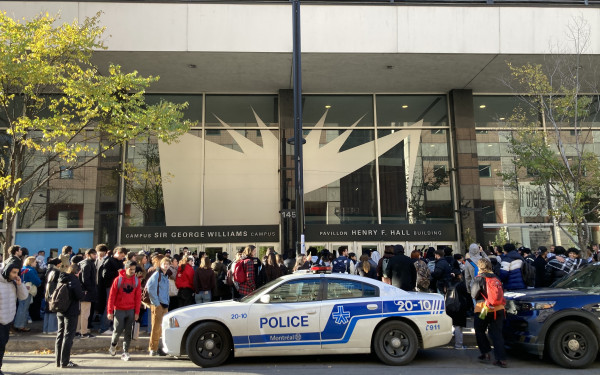Students voice concerns over Quebec’s newest financial barriers
Are the tuition hikes and Bill 96 driving students out of the province?
In the echoing halls of McMaster University, Nathalie White, a fourth-year psychology student, saw her grad school ambitions clouded by the news of a tuition increase, emphasizing the intersection of academic dreams with financial barriers.
“I had a list of graduate schools that I wanted to apply to next year,” said White. “I initially heard about the tuition increase briefly on the news and was immediately disheartened. I knew that I could simply not afford tuition fees.”
“This may be a bit jaded, but it seems like they’re saying you’re not welcome unless you can afford it. I understand wanting to preserve French culture […] but that just means that whoever has the money can come,” she added.
On Oct.13, Coalition Avenir Québec’s (CAQ) Minister of Higher Education Pascale Déry disclosed that the province intended to increase tuition fees for students from outside of Quebec. The new cost would rise from $8,992 to approximately $17,000 per year, starting fall 2024. Additionally, an established minimum tuition of $20,000 per year was stipulated for international students. For those who are already enrolled, they must remain in their current program for a maximum of five years, rendering deferrals and part-time studies more complicated.
This tuition hike hits Quebec's English universities the hardest—Concordia, Bishops and McGill. Despite claims from Dery stating, "I'm not closing the door to any anglophone student,” doubling out-of-province tuition undeniably imposes limitations.
Quebec French-language Minister Jean-François Roberge expressed in an interview with La Presse that, "We're fed up with managing the decline, protecting the language, curbing the erosion of the language; these are all defensive terms. It's time to regain some ground.”
In May 2022, Québec's National Assembly passed Bill 96. The bill is designed to bolster the use of French in the province. The law spawned various initiatives, including Francisation Québec. Introduced by the CAQ on June 1, 2023, this initiative aims to centralize French learning services for immigrants, contributing to Quebec's needs through temporary or permanent candidate selection, according to information taken from the Quebec government's website.
During their first six months in Quebec, new immigrants are entitled to services in English. However, after this period, they are expected to handle services in French as effortlessly as resident speakers. This is despite the fact that the government’s own internal report on the feasibility of the acquisition of French within a six-month timeframe deemed it nearly impossible.
According to Julia Balot, a McGill student, there seems to be a lack of clarity between citizens and the government in regards to what Quebec is aiming to achieve.
“It really makes me feel unwelcome here, especially by the government. Which is weird, because my day-to-day interactions with [Quebec-born francophones] tend to be pretty positive,” said Balot. “I’m happy to be able to go to a school like McGill [...] but I definitely worry that the culture on campus might change. Amplifying this division between anglophones and francophones seems like a step in the wrong direction.”
Students with a French citizenship or a francophone Belgian citizenship will be able to avoid the tuition increase. However, many Middle Eastern and North African international students speak French, but are subject to pay international fees. Yasmina May Hafiz, an international student from Morocco, called out the Quebec government’s double standard when it comes to French-speaking immigrants.
“I am already paying $24,000 a year,” Hafiz said.
Hafiz comes from a country colonized by France, where French is a major part of her life. She speaks it fluently, both back home and here.
“So why can’t I get lower tuition rates like French or Belgian citizens?” she continued. “I moved here, pay rent here, work here, speak French here, I add to the so-called fortification of French, but I am no longer a desirable immigrant because I am North African,” she added.
“If you value French this much, then reward the people who actually speak French and further your vision. When’s the line drawn? Like ‘oh no we don’t want any POC French people, we want only this region of French people.’ They want a cookie-cutter culture” — Yasmina May Hafiz
“If you value French this much, then reward the people who actually speak French and further your vision. When’s the line drawn? Like ‘oh no we don't want any POC French people, we want only this region of French people.’ They want a cookie-cutter culture,” she said.
While many believe this will affect Quebec’s economy and diversity, some acknowledge that it is a valid change, as it is Quebec's right to want to strengthen French in the province.
Students aren’t the only people protesting the government’s changes when it comes to the tuition hikes. Both Concordia President Graham Carr and McGill Principal Deep Saini have expressed their disapproval of the legislation, saying it would be a massive loss for the universities and the province. In response to recent tuition hikes, students have organized protests and initiated petitions in unprecedented numbers to express discontent.
Julianna Smith, the campaign coordinator for the Concordia Student Union (CSU), has worked, alongside other CSU members, to mobilize students and unions in response to proposed tuition hikes, drawing inspiration from Quebec's history of successful student-led campaigns.
The CSU is currently working on a campaign to fight the hikes. The union had been actively promoting a petition filed in the Quebec National Assembly, which was filed by Marwah Rizqy, a member of the Quebec National Assembly, on behalf of the CSU, Students' Society of McGill University and Bishop's University Students Representative Council. The petition successfully met the threshold of 30,000 signatures before its Nov. 27 deadline, with its primary objective to initiate a discussion in the National Assembly.
Beyond the immediate concern of increased tuition, the CSU is also shedding light on broader implications, including potential program cuts, larger class sizes, and reduced university resources resulting from the CAQ's announcement on tuition hikes. Concerns have escalated due to the government's lack of consultation and its swift enactment of bills, such as Bill 96, raising additional worries about xenophobic undertones.
This article originally appeared in Volume 44, Issue 7, published November 28, 2023.







